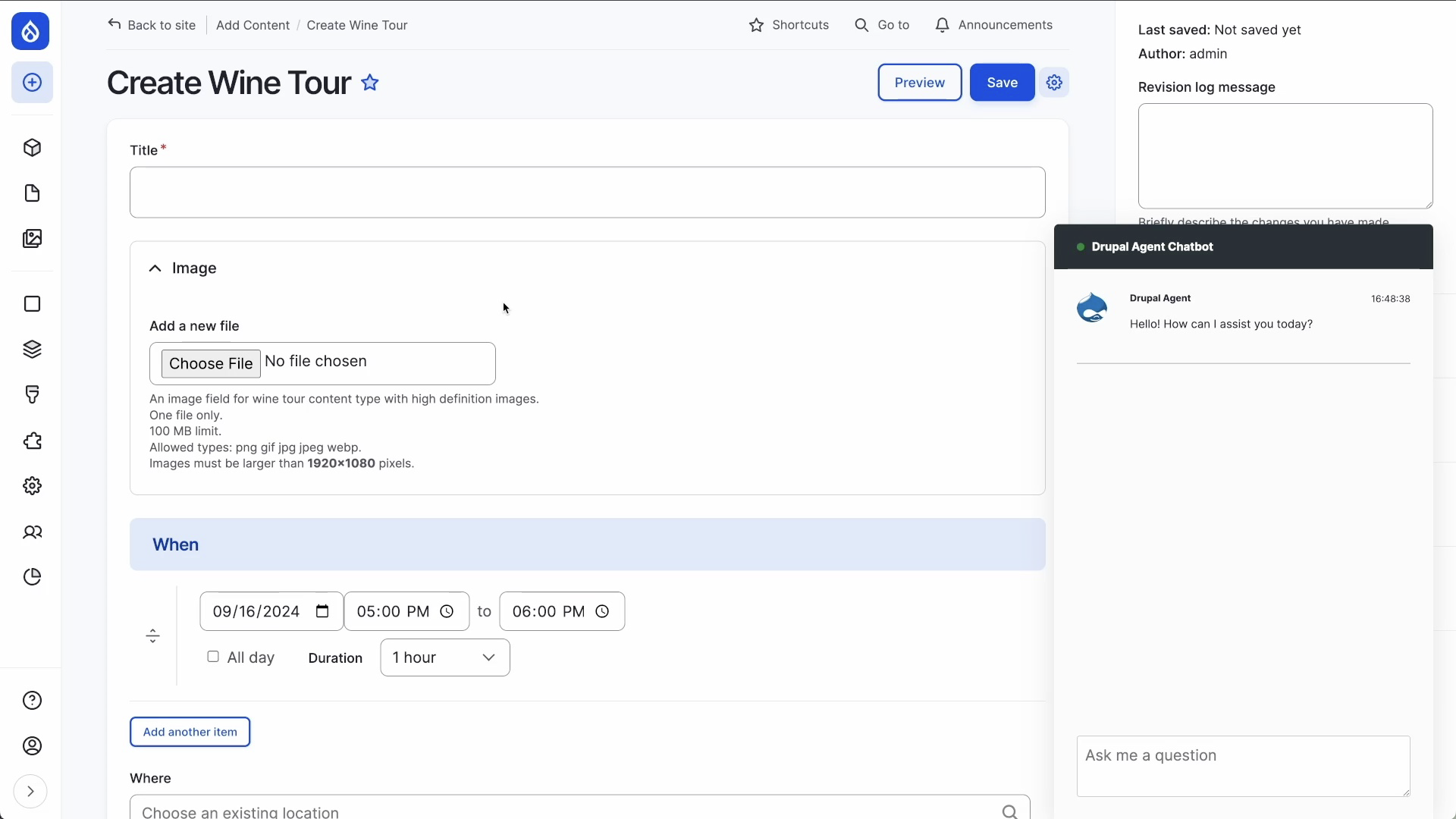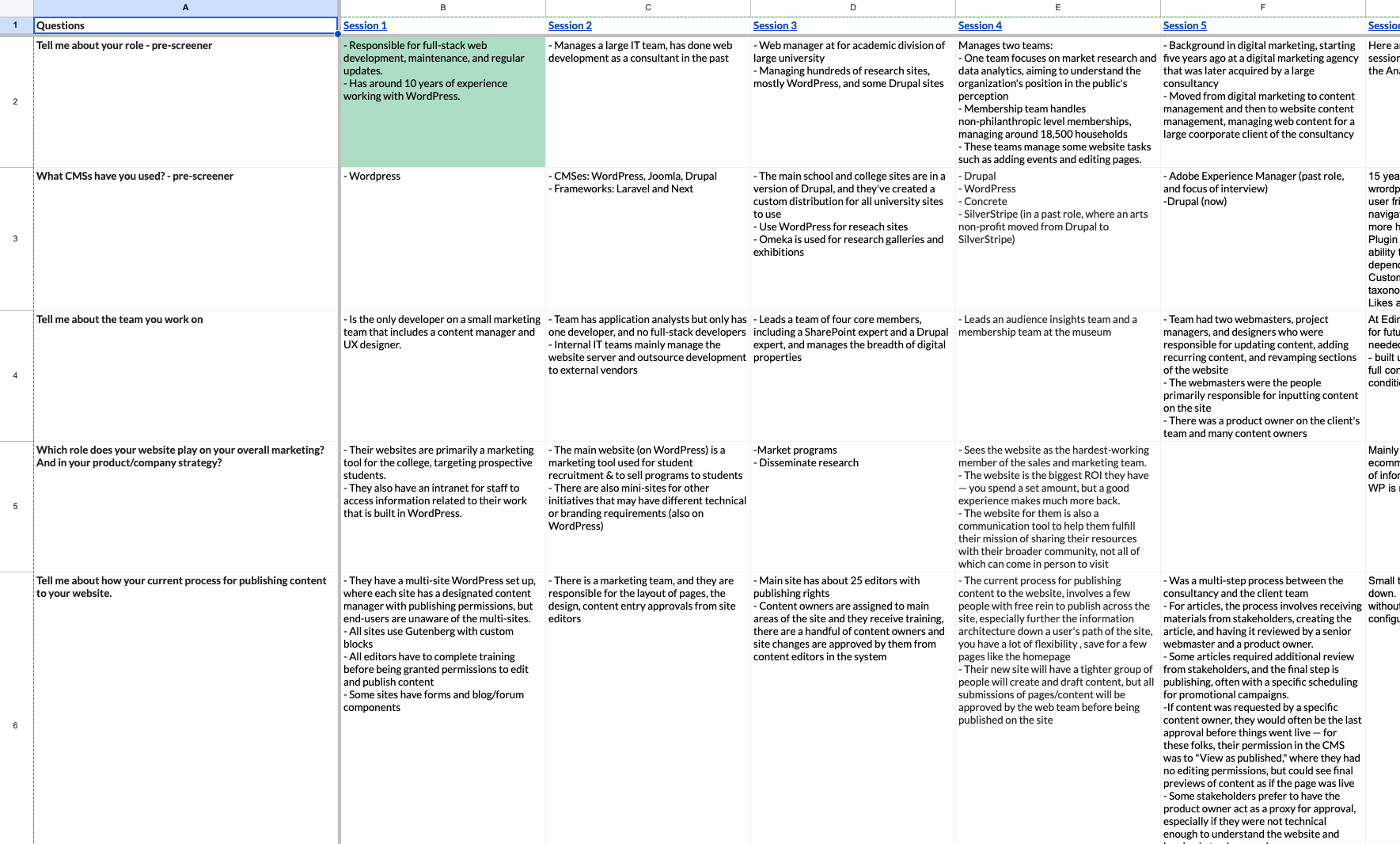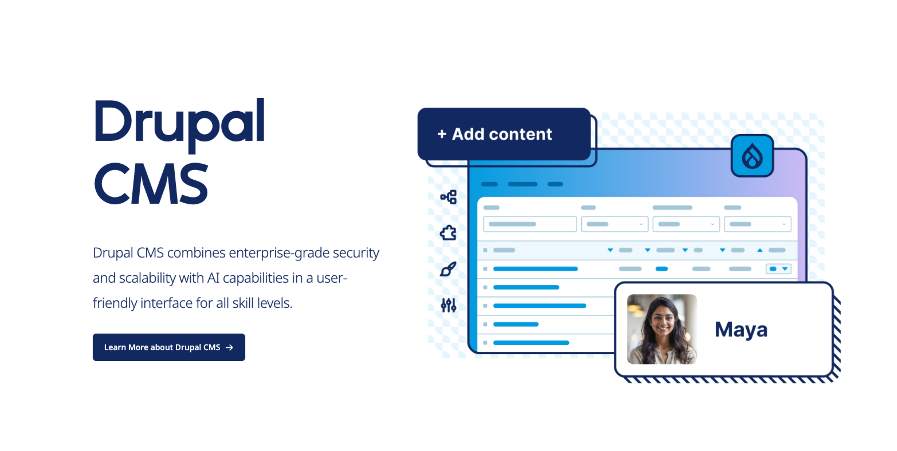Drupal CMS is a new product, out in beta now and launching in January 2025, that aims to be the best-in-class content management system for marketers. From December 9-11, at DrupalCon Singapore, more product announcements will be underway as Drupal CMS starts to take shape.

As part of the team defining what this new product will look like and how marketers will interact with it, I helped design a set of user interviews to dig into what marketers need when it comes to their CMS.
To deepen our understanding of what marketers need, my colleague Bruna Siqueira-Davis and other volunteers conducted interviews with CMS users across platforms and industries. The findings provide insights into the priorities, frustrations, and opportunities that inform how marketers select and use CMS platforms, and specifically what we should prioritize when designing Drupal CMS for marketers.
Here’s a recap of main takeaways from these interviews and how this can guide design decisions about Drupal CMS:
The Landscape of CMS Usage
Participants in our study came from diverse industries, including higher education, museums, non-profits, and government consulting. Their experience spanned a range of platforms, such as WordPress, Drupal, Contentful, and Adobe Experience Manager.
Many were familiar with older versions of Drupal, and shared their perceptions of its capabilities and usability.
One participant noted:
“Drupal was powerful, but it always felt like we needed a developer for even small changes.”
Others reflected on the limitations of other CMSs:
“I’ve worked with WordPress for years—it’s familiar, but we constantly hit walls when we need something more customizable.”
Key takeaway: Marketers often work with multiple platforms over time and compare them based on ease-of-use, flexibility, and integration capabilities. Impressions are often lasting, even when they’re based on old versions or how a CMS was configured for a particular client.
Priorities for Marketers in Selecting a CMS
Marketers prioritize features and functionalities that directly enhance their workflows. Among the top considerations:
Ease of Use:
A user-friendly interface is crucial to minimizing reliance on technical support, particularly for tasks like building a website or adding new features. Marketers value tools like drag-and-drop page builders and templates for creating pages and specific content types. Users expressed a desire to spend more time on content than configuration and expressed: "We need a CMS that lets us focus on creating and managing content, not troubleshooting."
Integration with Tools:
Seamless integration with marketing platforms, analytics tools, and CRMs is a high priority. For enterprise organizations, easy connectivity with Digital Asset Management (DAM) systems and identity management tools is essential for effective web governance. Users value the speed with which integrations can be set up. One said "Our CMS should work with our analytics and email platforms without us jumping through hoops."
Beyond Standard Content Management:
Marketers increasingly seek CMS solutions with advanced content management capabilities, such as reusable content blocks for landing pages and customizable publication workflows for drafting and approval processes.
Accessibility, Security, and Privacy:
Compliance with modern standards in accessibility, security, and privacy is non-negotiable.
Turn-Key Solutions:
Having access to well-maintained plugins, themes, and integrated hosting solutions simplifies website deployment, even for teams without dedicated developers.
Familiarity and Ecosystem Support:
Beyond features, marketers evaluate a CMS based on their team’s familiarity with the product and its support within their organization and the broader tech ecosystem. Having advocates and experts within the organization can significantly drive adoption.
A CMS should empower marketers to focus on creating and delivering impactful content and strategies, not navigating technical hurdles.
Pain Points with Current CMS Platforms
Participants in the research highlighted a few common frustrations:
- Steep learning curves, especially with legacy systems.
“It took months for our team to even feel comfortable publishing a blog post.” - Limited customization options without developer involvement.
“We’re stuck with templates that don’t reflect our brand, and customizing them is a nightmare.” - Difficulty in meeting modern marketing needs.
“Our CMS doesn’t support dynamic content or personalization, which feels like a missed opportunity.”

Other pain points included:
- Either Plugin overload or a limited Plugin ecosystem
- Hard to find settings and functionality within the CMS
- Abandoned plugins that organizations have invested time in using
- Poor ability to granularly grant roles and manage permissions
- Not enough layout flexibility or functionality available without custom development
- Rogue decisions get made (plugin installs, non-branded themes) because the platform allows for too much flexibility
Key takeaway: Many CMS platforms fail to balance the need for flexibility with the need for constraints, leaving marketers feeling they have too much reliance on technical colleagues, or a need to use another CMS or a third-party tool to get around the constraints of the platform.
Opportunities for Drupal CMS
The interviews also uncovered opportunities for Drupal CMS to stand out in a competitive CMS market:
- Reputation Refresh: Addressing misconceptions about Drupal’s complexity would help marketing leaders convince content editors and others at their organization that it’s the best choice.
“If Drupal can simplify the experience for non-technical users, I’d consider switching back.” - Enhanced Marketing Features: Incorporate AI-driven tools, intuitive analytics, and integrations for modern workflows.
“I want a CMS that supports personalized content and gives me actionable insights.” - Community Support: Leverage Drupal’s active community to provide training and resources that are specifically tailored to marketers.
“The Drupal community is great, but I wish there were more marketer-specific resources.”
Key takeaway: Marketers are open to reconsidering Drupal if it demonstrates benefits in usability, adaptability, and marketing-specific functionality. They want to feel like the CMS they use is built for marketers.
Interested in a preview of what Drupal CMS is like before its launch? Try an early release candidate, either directly in your browser or locally.

Conclusion
These interviews highlight a common thread: marketers want a CMS that simplifies their work while offering the flexibility to meet their growing needs. By addressing these priorities and pain points, Drupal CMS has an opportunity to position itself as a leading choice for marketing teams.
While other aspects of digital marketing use “rented space” on social media platforms and in advertising, a CMS is used to build key real estate in your digital marketing strategy that you should fully own and control. By incorporating these insights into Drupal CMS as the product evolves, we hope that marketers are able to take control over their websites more fully, while being able to focus more directly on their content and digital strategy.
Our next steps include benchmarking of various CMS features. We’d love to get your help if you have a few hours and want to contribute to this effort!
At Evolving Web, we are passionate about the marketer and content editor experience. Get in touch about how we can make your CMS easier to use!

